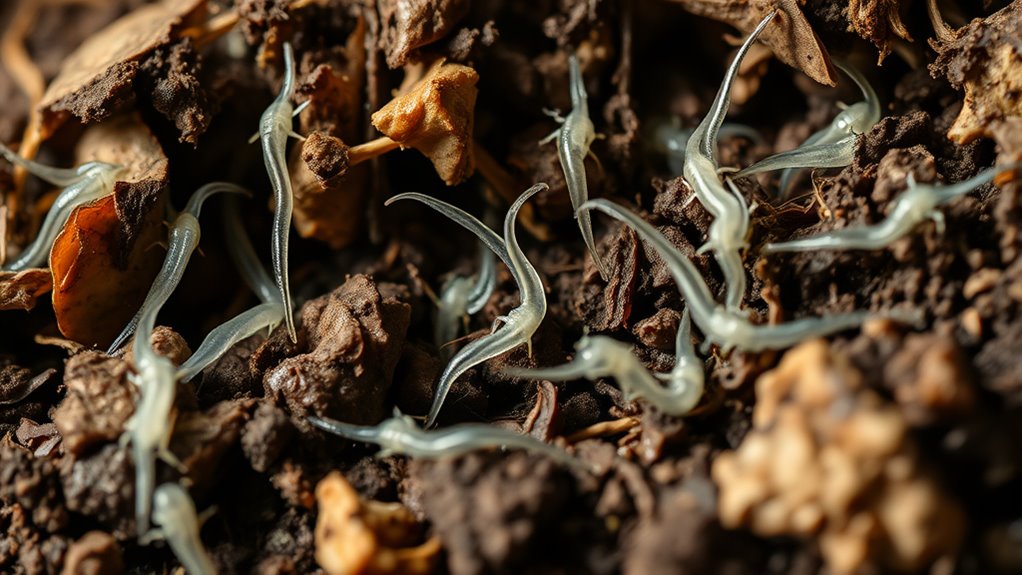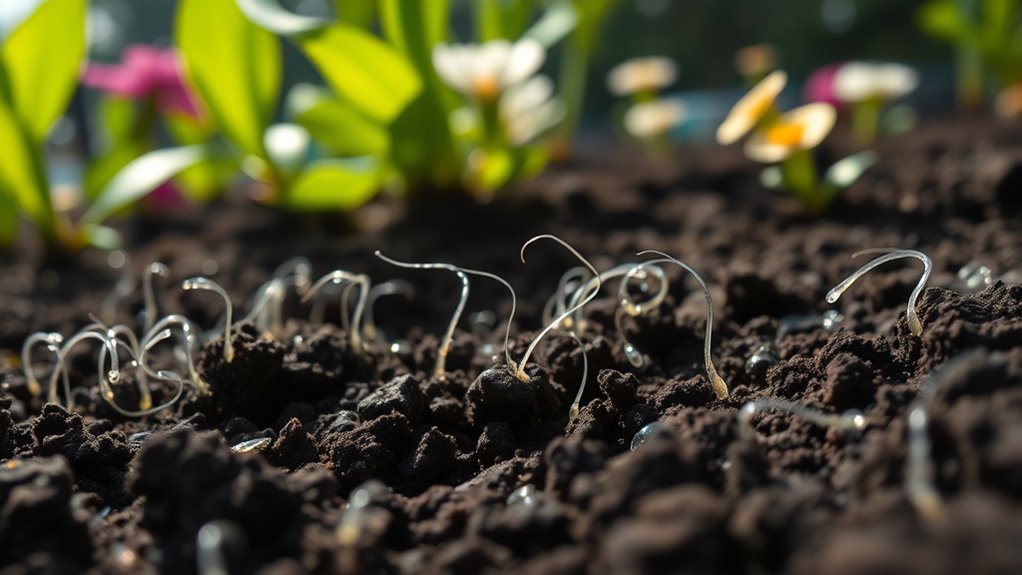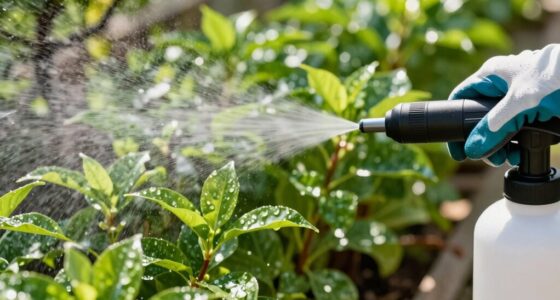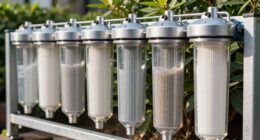Meet your garden’s bodyguards: beneficial nematodes are tiny, natural allies that hunt down soil-dwelling pests like grubs and beetle larvae, helping keep your plants healthy. You can apply them easily by watering them into the soil, preferably during cooler times of day, and guarantee ideal results with regular watering. These microscopic defenders work without harming beneficial insects or leaving residues. Want to discover how to make the most of these eco-friendly warriors? Keep exploring to find out more.
Key Takeaways
- Beneficial nematodes are microscopic worms that naturally target and kill soil pests like grubs and root maggots.
- They are applied by diluting in water and spraying directly onto moist soil during cooler parts of the day.
- These nematodes enter pest bodies, releasing bacteria that kill pests from the inside out, reducing pest populations naturally.
- Using beneficial nematodes promotes healthier soil and plants by controlling pests without chemicals or residues.
- Regular applications and maintaining soil moisture enhance their effectiveness in protecting your garden organically.

Beneficial nematodes are microscopic roundworms that naturally control soil-dwelling pests without the need for chemical pesticides. When you introduce them into your garden, you’re essentially enlisting tiny, effective defenders that work beneath the surface to keep pests at bay. These nematodes are a crucial part of healthy soil, as they not only manage pests but also contribute to overall soil health by encouraging a balanced ecosystem. Healthy soil supports strong plant growth, improved nutrient absorption, and resilience against diseases, making beneficial nematodes a smart choice for sustainable pest management.
Beneficial nematodes naturally control soil pests and promote healthy, balanced soil ecosystems.
You’ll find that applying beneficial nematodes is straightforward. They come in a liquid concentrate or powder form, which you dilute with water and then spray directly onto the soil. It’s best to do this during cooler parts of the day—early morning or late evening—to prevent the nematodes from drying out in the sun. Once in the soil, these tiny predators actively seek out target pests like root maggots, weevils, grubs, and beetle larvae. Their mode of attack is simple yet effective: they enter the pest’s body, release bacteria that kill the host, and then reproduce inside, releasing new nematodes to continue the cycle. This natural process ensures pest populations are considerably reduced without harming beneficial insects, pets, or humans.
By using beneficial nematodes, you’re supporting a form of pest management that aligns with nature’s own mechanisms. Unlike chemical pesticides, they don’t leave residues or toxins behind, which means your soil remains healthier and more alive. As pests decline, your plants experience less stress and are less likely to suffer from root damage, leading to healthier, more vigorous growth. Over time, this approach helps maintain a balanced soil ecosystem, where natural predation keeps pest levels under control without the need for repeated chemical interventions.
Keep in mind that for the best results, you should water your soil thoroughly before and after applying the nematodes. Moist soil provides an ideal environment for them to move around and find their targets. Regular applications may be necessary, especially in areas with heavy pest infestations or during peak pest seasons. Using beneficial nematodes is an eco-friendly, efficient way to protect your garden while enhancing soil health and promoting sustainable pest management practices. With patience and proper application, you’ll notice fewer pests and a more vibrant, resilient garden.
Frequently Asked Questions
Are Beneficial Nematodes Safe for Household Pets?
You’re wondering if beneficial nematodes are safe for household pets. Generally, they pose minimal pet safety or toxin concerns because they target only soil-dwelling pests and don’t harm animals or humans. When used properly, beneficial nematodes are a safe, natural pest control option. Still, it’s wise to follow application instructions and wash your hands afterward to guarantee peace of mind and avoid any accidental ingestion.
How Long Do Beneficial Nematodes Remain Active in the Soil?
Beneficial nematodes typically stay active in the soil for about 2 to 4 weeks, but their lifespan depends on soil moisture and environmental conditions. You need to keep the soil moist, as dry conditions reduce their activity and lifespan. Regular watering helps maintain ideal soil moisture, ensuring nematodes stay effective longer. Properly managed, they can continue protecting your plants from pests for several weeks.
Can Beneficial Nematodes Control All Types of Garden Pests?
Think of beneficial nematodes as a diverse army, each with a unique skill set. While some target specific pests effectively, their pest specificity means they won’t fight all garden pests. Nematode diversity is key—different species combat different pests, but no single type can handle every problem. You need to choose the right nematodes for your garden’s specific pest threats, ensuring your soil’s defense is both targeted and effective.
What Is the Best Time of Year to Apply Nematodes?
You should apply beneficial nematodes during peak pest activity, which varies seasonally. The best time of year for seasonal application is typically in warm, moist conditions when pests like grubs or beetles are most active underground. In most regions, spring and early fall are ideal, as soil temperatures are suitable for nematode survival and pest control. Avoid applying when the soil is too hot, cold, or dry.
Do Beneficial Nematodes Require Special Storage Conditions?
Did you know beneficial nematodes have a shelf life of about two years if stored properly? They don’t require special storage conditions, but you should keep them refrigerated between 38-50°F. Avoid freezing or exposing them to direct sunlight, as this can kill the nematodes. Proper storage guarantees they stay alive and effective until you’re ready to use them, making your pest control efforts more successful.
Conclusion
Now that you know about beneficial nematodes, you’re armed with a powerful tool to protect your garden naturally. Did you know that a single teaspoon of nematodes can hunt down and eliminate hundreds of soil pests? They’re like tiny, invisible bodyguards working tirelessly beneath the surface. Incorporating them into your gardening routine not only boosts plant health but also reduces chemical use. Trust these microscopic allies to keep your garden thriving—your plants will thank you!









